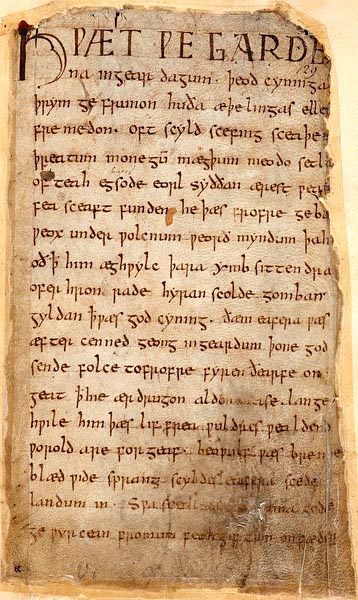 |
| The first page of Beowulf in an old manuscript (Wikipedia) |
Note: Some people think Shakespeare's language was "Old English." Bad news: that's Early Modern English! Read on to see what Old English is all about.
Get Ready: Do you know, or have you ever heard, German? Were you aware that English is considered a "Germanic Language"?
Old English (also called "Anglo-Saxon") isn't really recognizable as English at all to most modern speakers. It was brought over when Germanic peoples--the Angles, the Saxons, and the Jutes--invaded from the European continent in the mid-5th century. The language is closely related to some still found there.
The first Anglo-Saxon literature was written down in the mid-7th century, though, like the great epic Beowulf, it existed in oral form long before, even, perhaps, when the speakers were still on the continent.
Aside from the heroic poems, epics, chronicles, riddles, and so on, three early poems are often mentioned as exemplary: "Caedmon's Hymn," "The Dream of the Rood," and "The Seafarer." All three have Christian themes, like much Old English literature, because most of the earliest writings were preserved by monks.
Caedmon was one of the few Old English poets known by name (most were anonymous). He is said to have been an illiterate and tone-deaf cowherd who was given miraculous aid to burst forth with his "Hymn." According to the historian Bede (who died in 731), this is the oldest surviving English poem, composed between 658 and 680. It sings the praises of God in just nine short lines, and is Caedmon's only known composition.
"The Dream of the Rood," a Christian poem, tells of man who dreamed he spoke to the cross ("rood," related to the modern word "rod") on which Jesus was crucified. It is covered with beautiful gems--but has blood stains in between them. The cross told how it had been a tree, cut down for the purpose (it thought) of executing a criminal. But instead, the victim was the Lord, and the cross, like the victim, suffered piercing with nails, but later was glorified.
"The Seafarer" reflects the migratory, seagoing life of the Anglo-Saxon culture. It is told by an exile looking back on the hardships of his life at sea. Men on land, he says, have it easy by comparison. In the end, his longing for home becomes a longing for heaven, and the sea voyage symbolizes the journey to that eternal home.
Old English preserves a small but precious trove of literature often overlooked by modern readers.
--------- Read more: https://en.wikipedia.org/wiki/Old_English_literature
- Read about Old English literature (first three chapters) FREE online (in the first three chapters of this book)
- Read The Story of Beowulf
Practice: Match the term to its definition below:
- crucified
- exemplary
- glorified
- hardships
- illiterate
- migratory
- oral
- overlooked
- piercing
- tone-deaf
- ignored
- hung on a cross to die
- making a good example
- made special; elevated
- difficulties
- unable to read or write
- wandering; not staying in one place
- making a hole in
- spoken, not written
- not musical; unable to sing well
Answers are in the first comment below.
Submitted to the Shenzhen Daily for August 12, 2022


Answers to the Practice: 1. b; 2. c; 3. d; 4. e; 5. f; 6. g; 7. i; 8. a; 9. h; 10. j
ReplyDelete